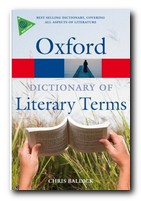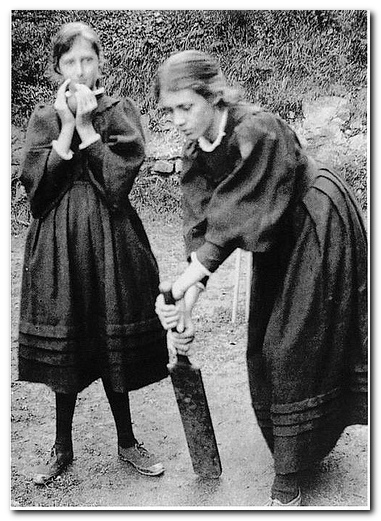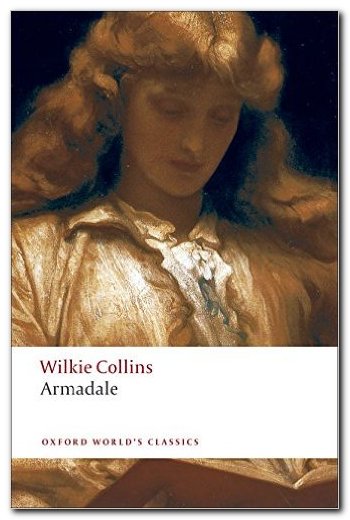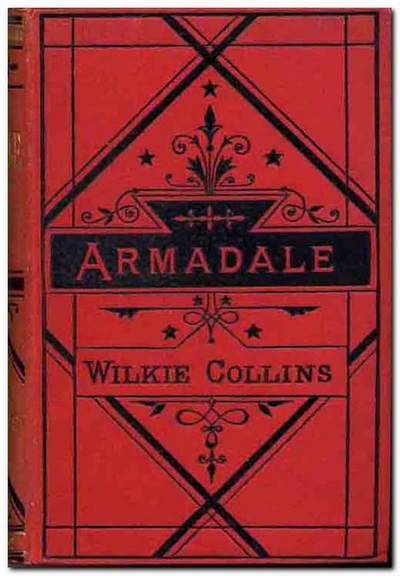tutorial, commentary, study resources, and web links
Amy Foster (1901) first appeared in the London Illustrated News and was published with Joseph Conrad’s other tales of endurance and extreme conditions, Falk, and The Secret Sharer, to form the collection Typhoon and Other Tales in 1903. What looks at first as if it is going to be a tale of positive redemption turns out to be a grim parable of a tragic or even pessimistic view of the world.
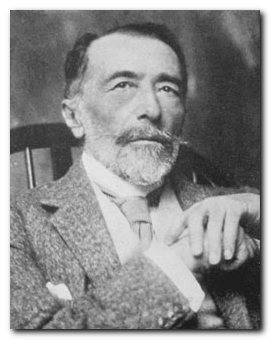
Joseph Conrad
Amy Foster – critical commentary
The immigrant experience
Yanko’s anguished journey across northern Europe is a deeply felt account of emigration and social isolation – one which reflects the experience of the many thousands of souls who uprooted themselves in their search for a better life in the West. Yanko is culturally and linguistically cut off from everything he experiences in transit.
Conrad’s great artistic achievement in this story is in these passages is to show the world through the emigrant’s naive and unsophisticated point of view. Yanko doesn’t understand where he is or what is going on around him. But we know he is on the railroad, passing through Berlin, or embarking on the ship that is to take him to America – or Amerika, for this was the route to be taken by Kafka’s Karl Rossman only a decade and a half later.
The passages dealing with the shipwreck and its awful aftermath are ones which Conrad imagined many times in his reflections on tragedies and accidents at sea, from Lord Jim and Typhoon to The Shadow-Line.
When Yanko touches dry land the story takes on distinctly Dickensian tones of the inhospitable marshes, and Amy Foster’s gesture of bringing bread to succour a ragged and desperate fugitive in precisely the same location as Pip’s generosity to Magwitch is a pure echo of Great Expectations.
Yanko’s positive determination to survive is a contrast to the xenophobic reaction of the locals, who with the exception of Swaffer and Dr Kennedy treat him abominably. Yanko survives and even prospers, with the ‘immigrant mentality’ of sceptical but stoic endurance. He seems to eventually integrate successfully, and yet ultimately he is betrayed by his own rescuer. Amy denies him in his most extreme moment of need.
Conrad was not a religious man, but there is everything in the story to suggest a Christian reading of the tale. Yanko suffers exile, shipwreck, humiliation, whiplashes, stoning, scorn, and rejection – yet he endures and forgives those who torment him. And he is ‘rescued’ by a simple girl who takes pity on him.
Since Yanko comes from eastern Europe it is common for critics to read the story biographically. Conrad’s family suffered exile at the hands of the Russians, and Conrad himself was technically an outsider in English society – even though he became a naturalized British subject in 1886 as soon as he had completed his examinations for the merchant service.
A great deal is made in the story of Yanko’s inability to express himself – though Conrad had been tri-lingual (Polish, English, French) since his childhood.
The narrative
In common with many of Conrad’s other tales and novels, the narrative is noticeably indirect. An un-named outer narrator introduces the story, but its main events are relayed to us by Dr Kennedy, one of the few local characters who is sympathetic to Yanko and his plight.
Amy Foster – study resources
![]() Amy Foster – Oxford World Classics – Amazon UK
Amy Foster – Oxford World Classics – Amazon UK
![]() Amy Foster – Oxford World Classics – Amazon US
Amy Foster – Oxford World Classics – Amazon US
![]() Amy Foster – Kindle eBook (includes screenplay)
Amy Foster – Kindle eBook (includes screenplay)
![]() Amy Foster – DVD film adaptation – Amazon UK
Amy Foster – DVD film adaptation – Amazon UK
![]() Amy Foster – eBook formats at Project Gutenberg
Amy Foster – eBook formats at Project Gutenberg
![]() Joseph Conrad: A Biography – Amazon UK
Joseph Conrad: A Biography – Amazon UK
![]() The Cambridge Companion to Joseph Conrad – Amazon UK
The Cambridge Companion to Joseph Conrad – Amazon UK
![]() Routledge Guide to Joseph Conrad – Amazon UK
Routledge Guide to Joseph Conrad – Amazon UK
![]() Oxford Reader’s Companion to Conrad – Amazon UK
Oxford Reader’s Companion to Conrad – Amazon UK
![]() Notes on Life and Letters – Amazon UK
Notes on Life and Letters – Amazon UK
![]() Joseph Conrad – biographical notes
Joseph Conrad – biographical notes
Amy Foster – plot summary
Yanko Goorall is a poor emigrant from ‘the eastern range of the Carpathians’. His family have made sacrifices and raised the money to send him in search of a new life in America, via an unscrupulous organisation. He travels across Europe in very difficult conditions, and is then a sole survivor of a shipwreck off the coast of Kent.
He has lost everything, is hungry, wretched, and knows no English. For days he staggers around the coastal marshlands. When he comes into contact with local inhabitants, they regard him as a madman, shun him, and throw stones at him. Finally, a young woman Amy Foster takes pity on him and gives him something to eat.
A neighbour provides him with some rudimentary shelter, and he gradually starts working and making himself useful. Amy is attracted to his foreign appearance, and falls in love with him. Against opposition from neighbours and relatives, she marries Yanko and they have a son. He is even given a house in return for saving a child’s life.
Some time later Yanko falls ill and rapidly descends into a delirious fever in which he reverts to his native Polish. Amy takes fright and deserts him in his most urgent moment of need, when he is crying out to her for water. Next day he is dead.
Film adaptation
Director Beeban Kidron (1997)
“Amy Foster”, renamed “Swept from the Sea”
starring Rachel Weiz and Vincent Perez
Principal characters
| I | the unnamed outer narrator |
| Dr Kennedy | a retired naval surgeon, and the principal inner-narrator |
| Isaac Foster | a farmer |
| Amy Foster | his daughter |
| Mr Smith | the tenant at New Barns Farm |
| Swaffer | Smith’s neighbour |
| Yanko Goorall | an east European emigrant |
| Johnny Goorall | Yanko and Amy’s son |
Biography
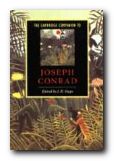 The Cambridge Companion to Joseph Conrad offers a series of essays by leading Conrad scholars aimed at both students and the general reader. There’s a chronology and overview of Conrad’s life, then chapters that explore significant issues in his major writings, and deal in depth with individual works. These are followed by discussions of the special nature of Conrad’s narrative techniques, his complex relationships with late-Victorian imperialism and with literary Modernism, and his influence on other writers and artists. Each essay provides guidance to further reading, and a concluding chapter surveys the body of Conrad criticism.
The Cambridge Companion to Joseph Conrad offers a series of essays by leading Conrad scholars aimed at both students and the general reader. There’s a chronology and overview of Conrad’s life, then chapters that explore significant issues in his major writings, and deal in depth with individual works. These are followed by discussions of the special nature of Conrad’s narrative techniques, his complex relationships with late-Victorian imperialism and with literary Modernism, and his influence on other writers and artists. Each essay provides guidance to further reading, and a concluding chapter surveys the body of Conrad criticism.
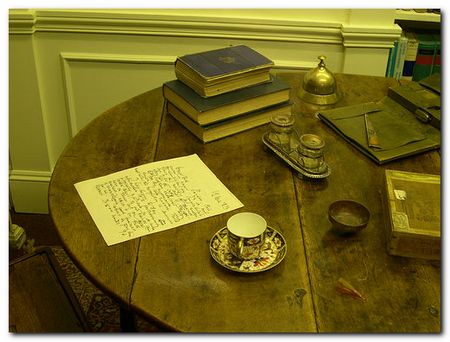
Joseph Conrad’s writing table
Further reading
![]() Amar Acheraiou Joseph Conrad and the Reader, London: Macmillan, 2009.
Amar Acheraiou Joseph Conrad and the Reader, London: Macmillan, 2009.
![]() Jacques Berthoud, Joseph Conrad: The Major Phase, Cambridge: Cambridge University Press, 1978.
Jacques Berthoud, Joseph Conrad: The Major Phase, Cambridge: Cambridge University Press, 1978.
![]() Muriel Bradbrook, Joseph Conrad: Poland’s English Genius, Cambridge: Cambridge University Press, 1941
Muriel Bradbrook, Joseph Conrad: Poland’s English Genius, Cambridge: Cambridge University Press, 1941
![]() Harold Bloom (ed), Joseph Conrad (Bloom’s Modern Critical Views, New Yoprk: Chelsea House Publishers, 2010
Harold Bloom (ed), Joseph Conrad (Bloom’s Modern Critical Views, New Yoprk: Chelsea House Publishers, 2010
![]() Hillel M. Daleski , Joseph Conrad: The Way of Dispossession, London: Faber, 1977
Hillel M. Daleski , Joseph Conrad: The Way of Dispossession, London: Faber, 1977
![]() Daphna Erdinast-Vulcan, Joseph Conrad and the Modern Temper, Oxford: Oxford University Press, 1991.
Daphna Erdinast-Vulcan, Joseph Conrad and the Modern Temper, Oxford: Oxford University Press, 1991.
![]() Aaron Fogel, Coercion to Speak: Conrad’s Poetics of Dialogue, Cambridge, Mass: Harvard University Press, 1985
Aaron Fogel, Coercion to Speak: Conrad’s Poetics of Dialogue, Cambridge, Mass: Harvard University Press, 1985
![]() John Dozier Gordon, Joseph Conrad: The Making of a Novelist, Cambridge, Mass: Harvard University Press, 1940
John Dozier Gordon, Joseph Conrad: The Making of a Novelist, Cambridge, Mass: Harvard University Press, 1940
![]() Albert J. Guerard, Conrad the Novelist, Cambridge, Mass: Harvard University Press, 1958
Albert J. Guerard, Conrad the Novelist, Cambridge, Mass: Harvard University Press, 1958
![]() Robert Hampson, Joseph Conrad: Betrayal and Identity, Basingstoke: Macmillan, 1992
Robert Hampson, Joseph Conrad: Betrayal and Identity, Basingstoke: Macmillan, 1992
![]() Jeremy Hawthorn, Joseph Conrad: Language and Fictional Self-Consciousness, London: Edward Arnold, 1979
Jeremy Hawthorn, Joseph Conrad: Language and Fictional Self-Consciousness, London: Edward Arnold, 1979
![]() Jeremy Hawthorn, Joseph Conrad: Narrative Technique and Ideological Commitment, London: Edward Arnold, 1990
Jeremy Hawthorn, Joseph Conrad: Narrative Technique and Ideological Commitment, London: Edward Arnold, 1990
![]() Jeremy Hawthorn, Sexuality and the Erotic in the Fiction of Joseph Conrad, London: Continuum, 2007.
Jeremy Hawthorn, Sexuality and the Erotic in the Fiction of Joseph Conrad, London: Continuum, 2007.
![]() Owen Knowles, The Oxford Reader’s Companion to Conrad, Oxford: Oxford University Press, 1990
Owen Knowles, The Oxford Reader’s Companion to Conrad, Oxford: Oxford University Press, 1990
![]() Jakob Lothe, Joseph Conrad: Voice, Sequence, History, Genre, Ohio State University Press, 2008
Jakob Lothe, Joseph Conrad: Voice, Sequence, History, Genre, Ohio State University Press, 2008
![]() Gustav Morf, The Polish Shades and Ghosts of Joseph Conrad, New York: Astra, 1976
Gustav Morf, The Polish Shades and Ghosts of Joseph Conrad, New York: Astra, 1976
![]() Ross Murfin, Conrad Revisited: Essays for the Eighties, Tuscaloosa, Ala: University of Alabama Press, 1985
Ross Murfin, Conrad Revisited: Essays for the Eighties, Tuscaloosa, Ala: University of Alabama Press, 1985
![]() Jeffery Myers, Joseph Conrad: A Biography, Cooper Square Publishers, 2001.
Jeffery Myers, Joseph Conrad: A Biography, Cooper Square Publishers, 2001.
![]() Zdzislaw Najder, Joseph Conrad: A Life, Camden House, 2007.
Zdzislaw Najder, Joseph Conrad: A Life, Camden House, 2007.
![]() George A. Panichas, Joseph Conrad: His Moral Vision, Mercer University Press, 2005.
George A. Panichas, Joseph Conrad: His Moral Vision, Mercer University Press, 2005.
![]() John G. Peters, The Cambridge Introduction to Joseph Conrad, Cambridge: Cambridge University Press, 2006.
John G. Peters, The Cambridge Introduction to Joseph Conrad, Cambridge: Cambridge University Press, 2006.
![]() James Phelan, Joseph Conrad: Voice, Sequence, History, Genre, Ohio State University Press, 2008.
James Phelan, Joseph Conrad: Voice, Sequence, History, Genre, Ohio State University Press, 2008.
![]() Edward Said, Joseph Conrad and the Fiction of Autobiography, Cambridge Mass: Harvard University Press, 1966
Edward Said, Joseph Conrad and the Fiction of Autobiography, Cambridge Mass: Harvard University Press, 1966
![]() Allan H. Simmons, Joseph Conrad: (Critical Issues), London: Macmillan, 2006.
Allan H. Simmons, Joseph Conrad: (Critical Issues), London: Macmillan, 2006.
![]() J.H. Stape, The Cambridge Companion to Joseph Conrad, Cambridge: Cambridge University Press, 1996
J.H. Stape, The Cambridge Companion to Joseph Conrad, Cambridge: Cambridge University Press, 1996
![]() John Stape, The Several Lives of Joseph Conrad, Arrow Books, 2008.
John Stape, The Several Lives of Joseph Conrad, Arrow Books, 2008.
![]() Peter Villiers, Joseph Conrad: Master Mariner, Seafarer Books, 2006.
Peter Villiers, Joseph Conrad: Master Mariner, Seafarer Books, 2006.
![]() Ian Watt, Conrad in the Nineteenth Century, London: Chatto and Windus, 1980
Ian Watt, Conrad in the Nineteenth Century, London: Chatto and Windus, 1980
![]() Cedric Watts, Joseph Conrad: (Writers and their Work), London: Northcote House, 1994.
Cedric Watts, Joseph Conrad: (Writers and their Work), London: Northcote House, 1994.
Other works by Joseph Conrad
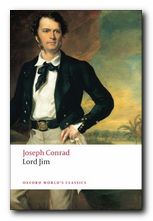 Lord Jim (1900) is the earliest of Conrad’s big and serious novels, and it explores one of his favourite subjects – cowardice and moral redemption. Jim is a ship’s captain who in youthful ignorance commits the worst offence – abandoning his ship. He spends the remainder of his adult life in shameful obscurity in the South Seas, trying to re-build his confidence and his character. What makes the novel fascinating is not only the tragic but redemptive outcome, but the manner in which it is told. The narrator Marlowe recounts the events in a time scheme which shifts between past and present in an amazingly complex manner. This is one of the features which makes Conrad (born in the nineteenth century) considered one of the fathers of twentieth century modernism.
Lord Jim (1900) is the earliest of Conrad’s big and serious novels, and it explores one of his favourite subjects – cowardice and moral redemption. Jim is a ship’s captain who in youthful ignorance commits the worst offence – abandoning his ship. He spends the remainder of his adult life in shameful obscurity in the South Seas, trying to re-build his confidence and his character. What makes the novel fascinating is not only the tragic but redemptive outcome, but the manner in which it is told. The narrator Marlowe recounts the events in a time scheme which shifts between past and present in an amazingly complex manner. This is one of the features which makes Conrad (born in the nineteenth century) considered one of the fathers of twentieth century modernism.
![]() Buy the book from Amazon UK
Buy the book from Amazon UK
![]() Buy the book from Amazon US
Buy the book from Amazon US
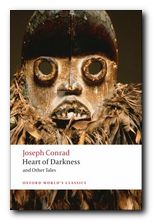 Heart of Darkness (1902) is a tightly controlled novella which has assumed classic status as an account of the process of Imperialism. It documents the search for a mysterious Kurtz, who has ‘gone too far’ in his exploitation of Africans in the ivory trade. The reader is plunged deeper and deeper into the ‘horrors’ of what happened when Europeans invaded the continent. This might well go down in literary history as Conrad’s finest and most insightful achievement, and it is based on his own experiences as a sea captain. This volume also contains ‘An Outpost of Progress’ – the magnificent study in shabby cowardice which prefigures ‘Heart of Darkness’.
Heart of Darkness (1902) is a tightly controlled novella which has assumed classic status as an account of the process of Imperialism. It documents the search for a mysterious Kurtz, who has ‘gone too far’ in his exploitation of Africans in the ivory trade. The reader is plunged deeper and deeper into the ‘horrors’ of what happened when Europeans invaded the continent. This might well go down in literary history as Conrad’s finest and most insightful achievement, and it is based on his own experiences as a sea captain. This volume also contains ‘An Outpost of Progress’ – the magnificent study in shabby cowardice which prefigures ‘Heart of Darkness’.
![]() Buy the book from Amazon UK
Buy the book from Amazon UK
![]() Buy the book from Amazon US
Buy the book from Amazon US
© Roy Johnson 2012
Joseph Conrad web links
![]() Joseph Conrad at Mantex
Joseph Conrad at Mantex
Biography, tutorials, book reviews, study guides, videos, web links.
![]() Joseph Conrad – his greatest novels and novellas
Joseph Conrad – his greatest novels and novellas
Brief notes introducing his major works in recommended editions.
![]() Joseph Conrad at Project Gutenberg
Joseph Conrad at Project Gutenberg
A major collection of free eTexts in a variety of formats.
![]() Joseph Conrad at Wikipedia
Joseph Conrad at Wikipedia
Biography, major works, literary career, style, politics, and further reading.
![]() Joseph Conrad at the Internet Movie Database
Joseph Conrad at the Internet Movie Database
Adaptations for the cinema and television – in various languages. Full details of directors and actors, production notes, box office, trivia, and quizzes.
![]() Works by Joseph Conrad
Works by Joseph Conrad
Large online database of free HTML texts, digital scans, and eText versions of novels, stories, and occasional writings.
![]() The Joseph Conrad Society (UK)
The Joseph Conrad Society (UK)
Conradian journal, reviews. and scholarly resources.
![]() The Joseph Conrad Society of America
The Joseph Conrad Society of America
American-based – recent publications, journal, awards, conferences.
![]() Hyper-Concordance of Conrad’s works
Hyper-Concordance of Conrad’s works
Locate a word or phrase – in the context of the novel or story.
More on Joseph Conrad
Twentieth century literature
Joseph Conrad complete tales
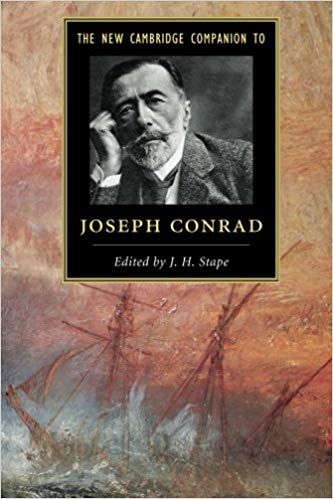
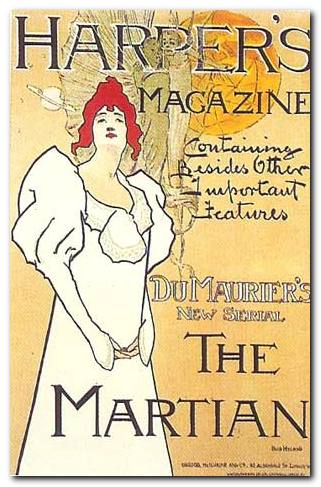
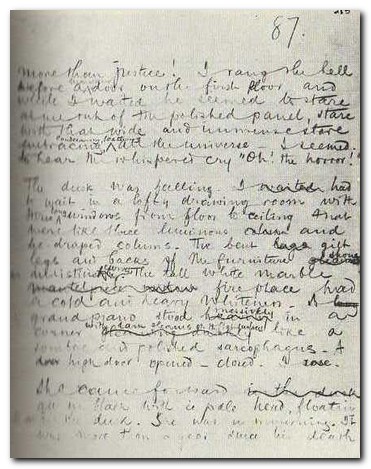
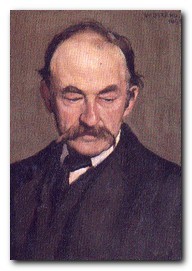
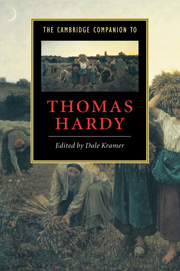
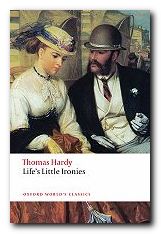 Ella Marchmill is a romantic young woman with an artistic temperament and an unfulfilled personal life. She is bored with her marriage, and has written and published poetry under the pseudonym John Ivy. On holiday with her husband and three children in Solentsea (Southsea) they find lodgings normally occupied by a young poet Robert Trewe, who moves out to accommodate them.
Ella Marchmill is a romantic young woman with an artistic temperament and an unfulfilled personal life. She is bored with her marriage, and has written and published poetry under the pseudonym John Ivy. On holiday with her husband and three children in Solentsea (Southsea) they find lodgings normally occupied by a young poet Robert Trewe, who moves out to accommodate them.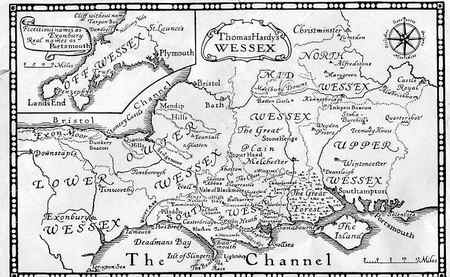
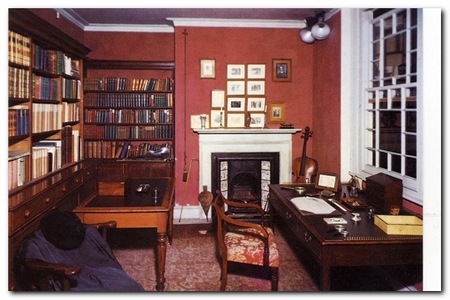
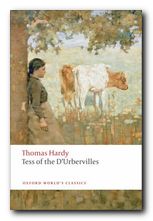 Tess of the d’Urbervilles
Tess of the d’Urbervilles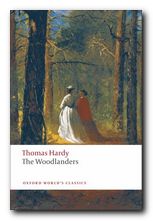 The Woodlanders
The Woodlanders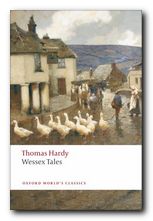 Wessex Tales
Wessex Tales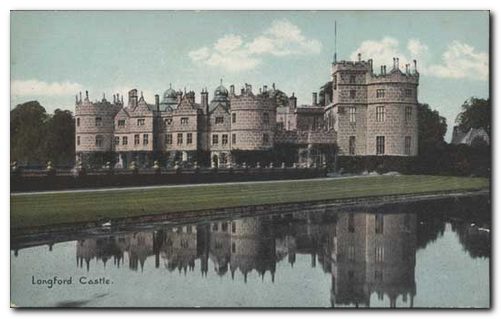


 The Aspern Papers
The Aspern Papers The Spoils of Poynton
The Spoils of Poynton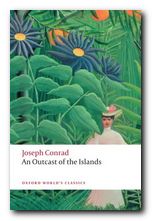
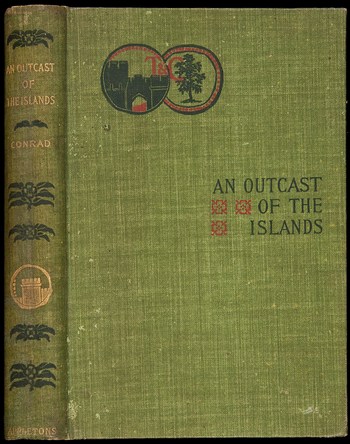
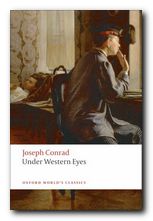 Under Western Eyes
Under Western Eyes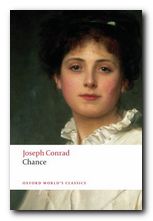 Chance
Chance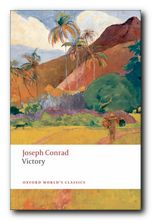 Victory
Victory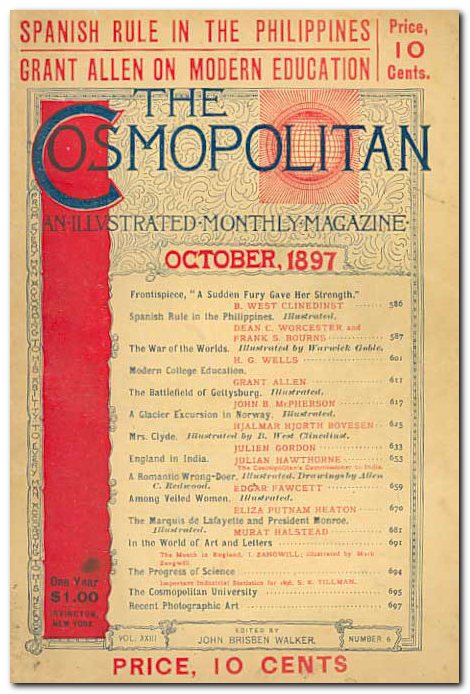
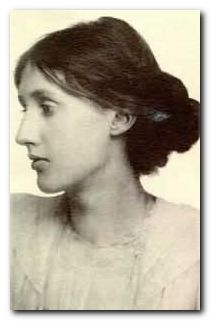
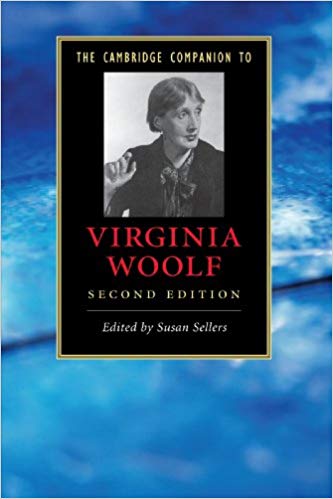
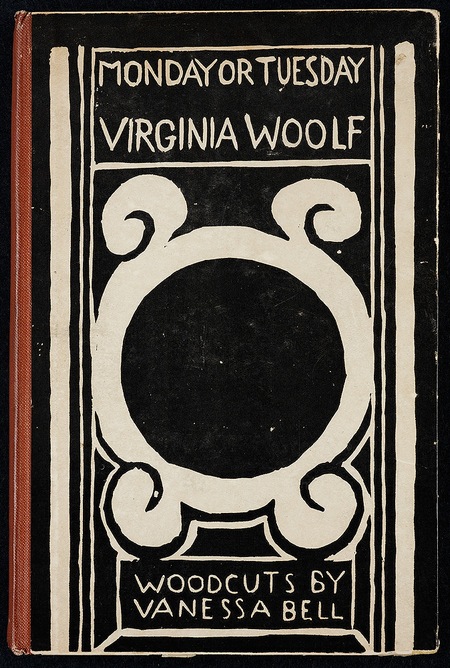
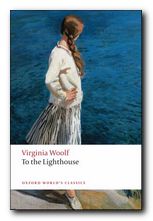 To the Lighthouse
To the Lighthouse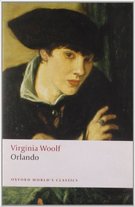 Orlando (1928) is one of her lesser-known novels, although it’s critical reputation has risen in recent years. It’s a delightful fantasy which features a character who changes sex part-way through the book – and lives from the sixteenth to the twentieth century. Using this device (which turns out to be strangely credible) Woolf explores issues of gender and identity as her hero-heroine moves through a variety of lives and personal adventures. Orlando starts out as an emissary to the Court of St James, lives through friendships with Swift and Alexander Pope, and ends up motoring through the west end of London on a shopping expedition in the 1920s. The character is loosely based on Vita Sackville-West, who at one time was Woolf’s lover. The novel itself was described by Nigel Nicolson (Sackville-West’s son) as ‘the longest and most charming love-letter in literature’.
Orlando (1928) is one of her lesser-known novels, although it’s critical reputation has risen in recent years. It’s a delightful fantasy which features a character who changes sex part-way through the book – and lives from the sixteenth to the twentieth century. Using this device (which turns out to be strangely credible) Woolf explores issues of gender and identity as her hero-heroine moves through a variety of lives and personal adventures. Orlando starts out as an emissary to the Court of St James, lives through friendships with Swift and Alexander Pope, and ends up motoring through the west end of London on a shopping expedition in the 1920s. The character is loosely based on Vita Sackville-West, who at one time was Woolf’s lover. The novel itself was described by Nigel Nicolson (Sackville-West’s son) as ‘the longest and most charming love-letter in literature’.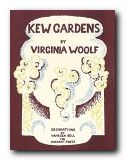 Kew Gardens
Kew Gardens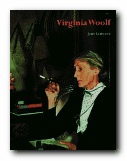 Virginia Woolf
Virginia Woolf